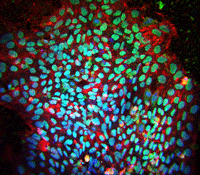Methods commonly used for the characterization of iPS or ES cells are based on specific antibody staining. Nevertheless, undifferentiated stem cell populations can also be characterized by high levels of both Alkaline Phosphatase (ALP) and Aldehyde Dehydrogenase (ALDH) activities. Both enzymes can be analyzed in live cells or cell extracts just by adding adapted fluorogenic substrates. These substrates make ALP and ADLH detection simple, robust and reliable. Such fluorogenic substrates are now very affordable. Today, I’d like to highlight 3 of them from Marker Gene Technologies.
Such fluorogenic substrates are now very affordable. Today, I’d like to highlight 3 of them from Marker Gene Technologies.
For the detection of ALP
You can use either Fluorescein diphosphate (FDP) or 3-Phenylumbelliferone 7-O-phosphate. FDP is one of the most sensitive fluorogenic phosphatase substrates. The colorless nonfluorescent FDP is hydrolyzed to fluorescent fluorescein with unique spectral properties. 3-Phenylumbelliferone 7-O-phosphatase substrate releases a bright green fluorescent dye (3-phenylumbelliferone) once hydrolysed at the site of enzyme activity.
For the detection of ALDH
The probe Resorufin acetate is a very reasonable choice. Resorufin acetate is a substrate for cytosolic aldehyde dehydrogenase, chymotrypsin activity and is also useful in cell viability assays and high throughput screening of esterase activity in a live cell format.
How about you?
For analyzing the differentiation status of stem cells, what are your favorite fluorogenic substrates to analyze in vitro pluripotent Stem cells? [contact-form to=’europe@tebu-bio.com’ subject=’Fluorogenic substrate for puripotent iPS and Stem cells’][contact-field label=’Name’ type=’name’ required=’1’/][contact-field label=’Email’ type=’email’ required=’1’/][contact-field label=’Comment’ type=’textarea’ required=’1’/][/contact-form]



